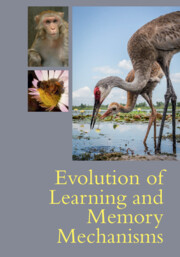Book contents
- Evolution of Learning and Memory Mechanisms
- Evolution of Learning and Memory Mechanisms
- Copyright page
- Contents
- Figures
- Tables
- Contributors
- Preface
- Introduction
- Part I Evolution of Learning Processes
- Part II Evolution of Memory Processes
- 16 The Evolution of Memory as an Immediate Perceptual Identification Mechanism
- 17 Episodic Memory in Animals
- 18 Evolutionary Origins of Complex Cognition
- 19 Evolution of Memory Systems in Animals
- 20 What Laboratory and Field Approaches Bring to Bear for Understanding the Evolution of Ursid Cognition
- 21 Distinguishing Mechanisms of Behavioral Inhibition and Self-control
- 22 Metacognitive Monitoring and Control in Monkeys
- 23 Adaptive Memory
- 24 Remembering Cheaters
- 25 Development of Memory Circuits under Epigenetic Regulation
- 26 Constraints on Learning and Memory
- Index
- References
18 - Evolutionary Origins of Complex Cognition
from Part II - Evolution of Memory Processes
Published online by Cambridge University Press: 26 May 2022
- Evolution of Learning and Memory Mechanisms
- Evolution of Learning and Memory Mechanisms
- Copyright page
- Contents
- Figures
- Tables
- Contributors
- Preface
- Introduction
- Part I Evolution of Learning Processes
- Part II Evolution of Memory Processes
- 16 The Evolution of Memory as an Immediate Perceptual Identification Mechanism
- 17 Episodic Memory in Animals
- 18 Evolutionary Origins of Complex Cognition
- 19 Evolution of Memory Systems in Animals
- 20 What Laboratory and Field Approaches Bring to Bear for Understanding the Evolution of Ursid Cognition
- 21 Distinguishing Mechanisms of Behavioral Inhibition and Self-control
- 22 Metacognitive Monitoring and Control in Monkeys
- 23 Adaptive Memory
- 24 Remembering Cheaters
- 25 Development of Memory Circuits under Epigenetic Regulation
- 26 Constraints on Learning and Memory
- Index
- References
Summary
Cognitive abilities in animals can range from simple learning mechanisms to complex mechanisms including causal reasoning, imagination, foresight, and perspective taking. These complex cognitive abilities are thought to have evolved in primates in response to socio-ecological challenges faced by their ancestors. Corvids, a group of large-brained birds, are thought to have evolved comparable cognitive abilities in response to similar socio-ecological pressures. Cephalopods, including octopus, cuttlefish, and squid, also exhibit a subset of complex cognitive abilities despite having evolved independently. Here, we discuss the evolutionary pressures that might have facilitated the emergence of complex cognition in these diverse animal groups. By identifying the cognitive similarities between diverse taxa and recognizing the likely drivers for their emergence, we can derive a more comprehensive understanding of cognitive evolution.
- Type
- Chapter
- Information
- Evolution of Learning and Memory Mechanisms , pp. 317 - 338Publisher: Cambridge University PressPrint publication year: 2022

